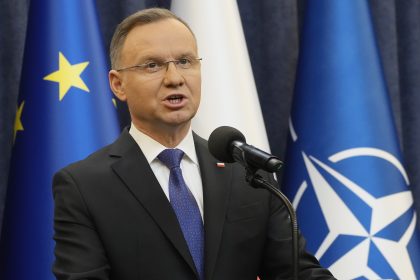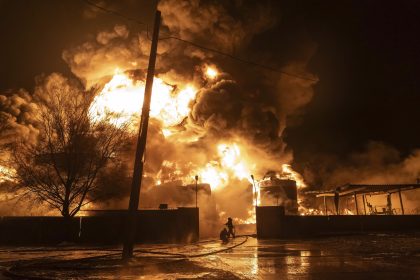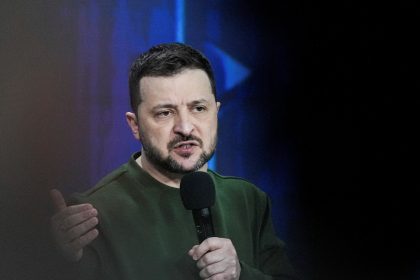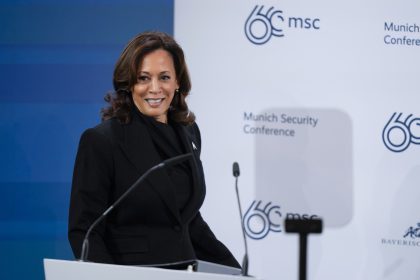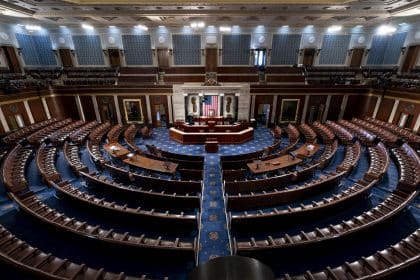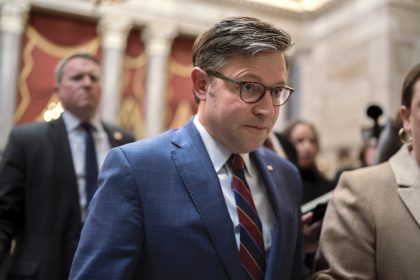Biden Announces Tough New Sanctions Against Russia for Ukraine Invasion
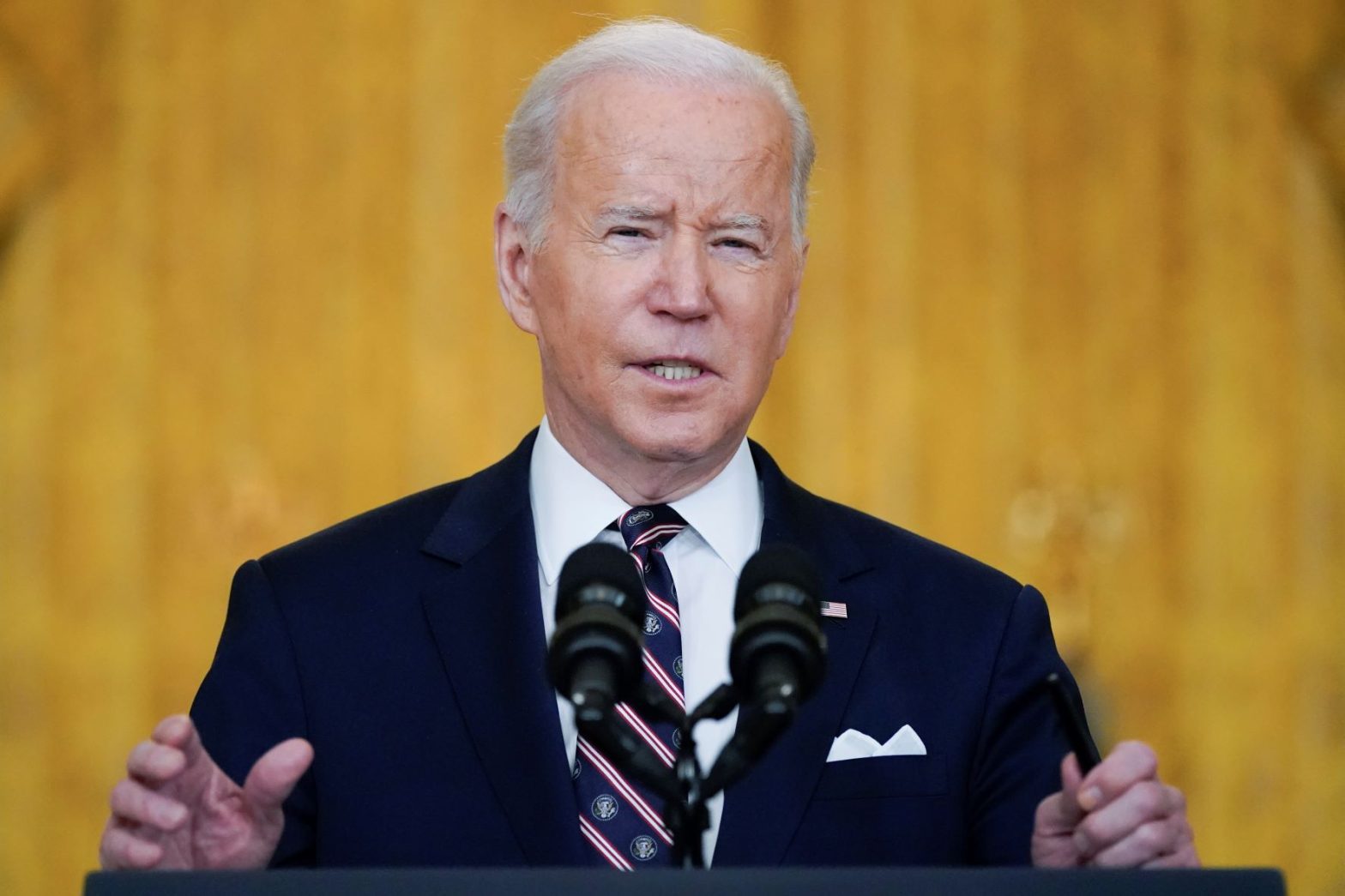
WASHINGTON — Declaring that the Russian invasion of Ukraine has begun, President Joe Biden on Tuesday announced the first tranche of sanctions he hopes will deter President Vladimir Putin from further attacks and punish the oligarchs who support the Russian leaders.
Referring to Putin’s decision Monday night to recognize as independent two separatist regions in eastern Ukraine, the president asked rhetorically, “Who in the Lord’s name is Putin to think he has the right to declare new so-called countries on territory that belongs to his neighbors?
“This is a flagrant violation of international law and demands a firm response from the international community,” Biden said.
“Let’s be clear, none of us should be fooled. None of us will be fooled. There is no justification for Russia’s invasion of Ukraine or for the continued threat that remains for the days ahead,” the president added.
Speaking from the East Room in the White House, the president then went on to announce that effective immediately and in coordination with U.S. allies, the administration is imposing “blocking sanctions” on two of Russia’s largest banking institutions, the VEB, which a senior White House official described as “a glorified piggybank for the Kremlin,” and Promsvyazbank, a “special-purpose bank” serving the Russian military and defence industry.
A block of these banks, which together control an estimated $80 billion in assets, means they can no longer make any transactions with the U.S. or Europe and their assets in the respective financial systems are frozen.
If the invasion proceeds, the U.S. stands ready to “press the button” on further action on the very largest Russian financial institutions, including Sberbank and VTB, which collectively hold almost $750 billion in assets, or more than half the total in Russia as a whole, the official said.
The president is also levying sanctions directly on the Russian government, the Russian Central Bank and its sovereign wealth funds, cutting them off from U.S. financing. The European Union has adopted a similar measure, meaning the Kremlin can no longer raise money from the U.S. and Europe, and its new debt can no longer be traded in U.S. or European markets.
“It can no longer raise money from the west and cannot trade in its new debt on our markets or European markets either,” Biden said.
What that means is that over time these entities will have higher borrowing costs and less capacity to invest, while Russia itself will experience lower growth and lower productive capacity.
“It also means Putin will have less of an overall ability to exert leverage on the world stage,” a senior administration official said
In a call after the president spoke, the official said, “Make no mistake, this is only the sharp edge of the pain we can inflict.”
The administration was particularly pleased with how quickly the newly announced sanctions came together — in less than 24 hours after consultations with the European Union, the United Kingdom, Canada, Japan and Australia.
This appeared especially so in the case of Germany’s decision to shut down the Nord Stream 2 natural gas pipeline extending from Russia into Germany.
“This came together after consultations overnight with Germany, and as a result, a pipeline that Vladimir Putin invested $11 billion in and which was expected to be a cash cow for Russia’s financial coffers, will now go to waste,” the official said.
“But it’s not just about the money. This decision will relieve Russia’s geostrategic chokehold over Europe through its supply of natural gas, and it’s a major turning point in the world’s energy independence from Russia,” he said.
Biden said if the situation continues to worsen, the U.S. will take further steps, beginning Wednesday, to directly target Russia’s “elites” and their family members.
“Those who have gained from Putin’s policies should share in the pain as well,” he said.
“As Russia contemplates its next move, we have our next move prepared as well. Russia will pay an even steeper price if it continues its aggression, including additional sanctions,” the president said.
After Biden’s speech, some questioned why there were no sanctions barring Russia from SWIFT, the Society for Worldwide Interbank Financial Telecommunication.
SWIFT is the Belgian cooperative society that serves as an intermediary and executor of financial transactions between banks worldwide. Many have suggested that an exclusion from SWIFT would have a crippling impact on Russia — much more so than the sanctions announced Tuesday.
“SWIFT is not off the table,” the administration official said. “We just think that there are other severe measures that can have a comparable impact on Russia, that we can take in lockstep with Europe and that don’t have the broader spillover costs.
“That said, we remain open to any option we can deploy, again, depending on how Russia makes its next move.”
The president went on to say the U.S. will continue to provide defensive assistance to Ukraine, and will continue to work with its NATO allies to “address these bizarrely asserted claims that these territories are no longer part of Ukraine.”
At the same time, President Biden said the U.S. has no intention of fighting Russia. “But we want to send an unmistakable message that the United States, together with our allies, will defend every inch of NATO territory and abide by the commitments we made to NATO.
“We still believe that Russia is poised to go much further in launching a massive military attack against Ukraine. I hope I’m wrong about that. But Russia has already escalated this threat against the rest of [the] Ukrainian territory, including major cities and including the capital city of Kyiv,” Biden said.
During his remarks, the president acknowledged that there will be “a cost of defending freedom,” and that, on some level, it will be felt in the United States.
“We need to be honest about that,” the President said.
“But as we do this, we’ll take robust action to make sure the pain of our sanctions is targeted at the Russian economy, and not at ours,” he said. “We are closely monitoring energy supplies for any disruption and we’ve executed a plan in coordination with major oil … producers toward a collective investment to secure stability and global energy supply. In this way, we’re striving to limit the pain [on] American people at the gas pump. This is critical.
With respect to gas prices, the administration official said he was aware there had been some talk about energy prices moving higher since the onset of tensions over Ukraine.
“But I would emphasize, they’re not moving higher because Nord Stream 2 has been halted; they’re moving higher because people are worried Putin will weaponize energy and try to hold the world hostage,” he said. “That’s why the right response is to reduce Europe’s addiction to Russian gas. And that’s what today’s action does.
“In the meantime, we’ll continue to work with our partners in Europe to search for natural gas supplies from all over the world. And with respect to oil, we have an ongoing effort right now, in coordination with oil producers and oil consumers, to make sure the world knows we’re going to continue to have stable energy supplies.”
As events along Ukraine’s eastern border escalated over the weekend, a senior administration official said the White House was going to assess the crisis based “on what Russia does … not on what Russia says.”
“Unfortunately, the sequence of events appears to be proceeding exactly as predicted by Secretary of State Antony Blinken last week before the United Nations Security Council,” the official said.
On Thursday, Blinken traveled to New York, where he told the security council that Russia has been amassing troops for months along Ukraine’s borders in Russia, Belarus and occupied Crimea, and “our information clearly indicates these forces — including ground troops, aircraft, ships — are preparing to launch an attack against Ukraine in the coming days.”
Though he admitted no one could predict precisely how things will play out, Blinken said it was clear Russia was taking “steps down the path of war.”
He also said the escalation would likely play out something like this:
First, Russia would manufacture a pretext for its attack. This could be a violent event that Russia will blame on Ukraine, or an outrageous accusation that Russia will level against the Ukrainian government. We don’t know the exact form it will take. It could be a fabricated so-called “terrorist” bombing inside Russia, the invented discovery of a mass grave, a staged drone strike against civilians, or a fake — even a real — attack using chemical weapons, Blinken said.
“Russia may describe this event as ethnic cleansing or a genocide, making a mockery of a concept that we in this chamber do not take lightly, nor do I take lightly based on my family history,” he said.
Second, in response to this manufactured provocation, the highest levels of the Russian government would “theatrically convene emergency meetings to address the so-called crisis.”
“The government will issue proclamations declaring that Russia must respond to defend Russian citizens or ethnic Russians in Ukraine,” Blinken said.
Next, the long-planned attack would begin, with Russia combining brute military force with targeted cyberattacks.
“After that, Russian tanks and soldiers will advance on key targets that have already been identified and mapped out in detailed plans. We believe these targets include Ukraine’s capital, Kyiv, a city of 2.8 million people,” Blinken said.
Much of this has come true, administration officials said. “Russia has increased the number of false-flag events and provocations over the past few days, and it called a security council meeting giving Putin broad war powers.
That was followed by the recognition of sovereign Ukrainian territory as independent republics, with whom Russia immediately signed so-called friendship and mutual aid agreements.
In doing so, Russian President Vladimir Putin delivered a speech that many in diplomatic circles thought was a stunner, if not surprising.
“Why was it necessary to make an enemy out of us?” Putin asked, before answering his own question. “They didn’t want such a large, independent country as Russia. In this lies the answer to all questions.
“We clearly understand that in such a scenario, the degree of military threat to Russia will rise cardinally, by multiple times,” Putin said, referring to the potential of Ukraine joining NATO.
“If our ancestors heard about this, they would probably not believe it. And we don’t want to believe it. But that’s how it is,” he said angrily.
“Let me emphasize once again that Ukraine for us is not just a neighboring country. It is an integral part of our own history, culture, spiritual space,” the Russian president continued. “These are our comrades, relatives, among whom are not only colleagues, friends, former colleagues, but also relatives, people connected with us by blood, family ties.”
As for the devastating sanctions Biden has promised would be levied if an invasion of Ukraine happened, Putin dismissed this rhetoric as “blackmail.”
“They are threatening us with sanctions,” he said, but he went on to imply the sanctions would come whether they were attached to the Ukraine situation or not.
“A new pretext will always be found or fabricated, irrespective of the situation in Ukraine,” he said.
“The purpose is simple: to keep Russia behind, to prevent it from developing. And they will do it before, even without any formal pretext. Just because we exist. We will never give up our sovereignty, national interest and our values,” Putin declared.
“No one should mistake these theatrics as legitimate statecraft,” a senior administration official said on Monday in a briefing with reporters.
“This is Potemkin politics — President Putin accelerating the very conflict he has created,” the official added.
On Tuesday, members of Russia’s upper house, the Federation Council, voted unanimously to authorize President Vladimir Putin to use military force outside the country.
Shortly after, Putin laid out three conditions to end the crisis that has threatened to plunge Europe back into war, raising the specter of massive casualties, energy shortages across the continent and economic chaos around the globe.
Putin said the crisis could be resolved if Kyiv recognizes Russia’s sovereignty over Crimea, the Black Sea peninsula that Moscow annexed from Ukraine in 2014, renounces its bid to join NATO and partially demilitarizes. The west has decried the annexation of Crimea as a violation of international law and has previously flatly rejected permanently barring Ukraine from NATO.
Asked whether he has sent any Russian troops into Ukraine and how far they could go, Putin responded, “I haven’t said that the troops will go there right now.” He added coyly that “it’s impossible to forecast a specific pattern of action –- it will depend on a concrete situation as it takes shape on the ground.”
On Tuesday morning, Sen. Lindsey Graham, R-S.C., ranking member of the Senate Budget Committee, told reporters in Pendleton, South Carolina, he predicted Republicans in Congress would support Biden’s actions so long as they believed the White House was making a “firm and forceful response to Putin” that made clear the provocation on Ukraine’s border “will end sooner rather than later.”
“I support President Biden’s decision to beef up the American presence and NATO allies surrounding Russia to make NATO stronger, not weaker. We have one president at a time. President Biden is the president of the United States, and to the extent that I can help him push back against Putin and bring stability to the world, I will gladly do so,” the senator said.
“I’ve been on the phone with Democratic senators for the last two days. We’re talking about an emergency supplemental bill to be created next week that would create a task force of the Department of Justice, Department of State, Treasury, and maybe DOD to go after the oligarchs who enrich themselves from Putin’s misadventures,” Graham continued. “It’s now time for that crowd to lose their yachts, lose their luxury apartments, and to pay a price for being part of a thuggish group — a nation-state that really is a mafia-state.
“I want the [Russian] oligarchs to understand what’s coming their way — the price that you’re going to pay. I literally want to work with the British government and the German government to have a sort of united front, because a lot of these assets are in London. They’re in Berlin. They’re in New York,” Graham said. “These assets have been generated by an association with Putin to the detriment of the Russian people and world stability. That’s one thing that I think is very bipartisan. I want to see cops go in and take apartments, fine art, and seize yachts from a bunch of thugs and crooks. I want to put money on the table to have more weapons for Ukraine to fight. I want more protection when it comes to cyber, and I want to go at this big, and I want to go at it hard.”
In the wake of the latest developments in Russia, President Biden held calls with Ukrainian President Volodymyr Zelenskyy, French President Emmanuel Macron and German Chancellor Olaf Scholz.
During these calls, the president strongly condemned President Putin’s decision to recognize the so-called Donetsk and Luhansk People’s Republics.
“We will continue to consult with our allies and partners about both diplomatic solutions and the consequences we will impose on Russia should it further invade Ukraine,” the senior administration official said, adding, “We’ll continue to pursue diplomacy until the tanks roll, but we are under no illusions about what is likely to come next. And we are prepared to respond decisively when it does.”
Dan can be reached at [email protected] and at https://twitter.com/DanMcCue

















